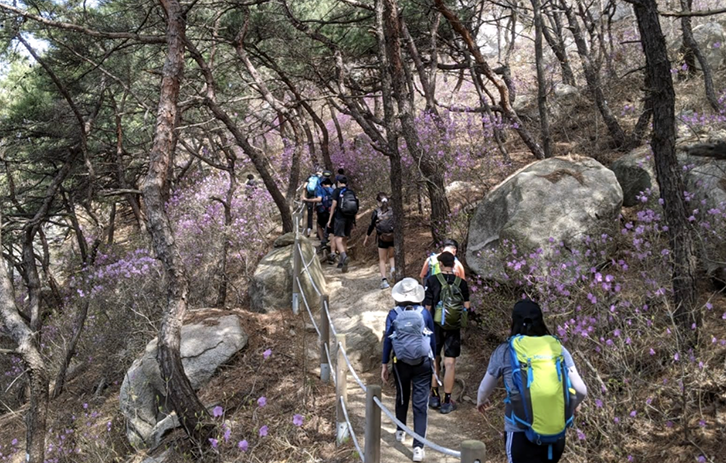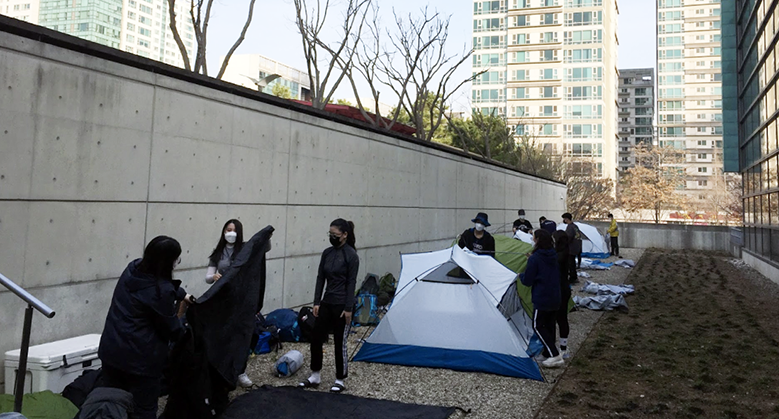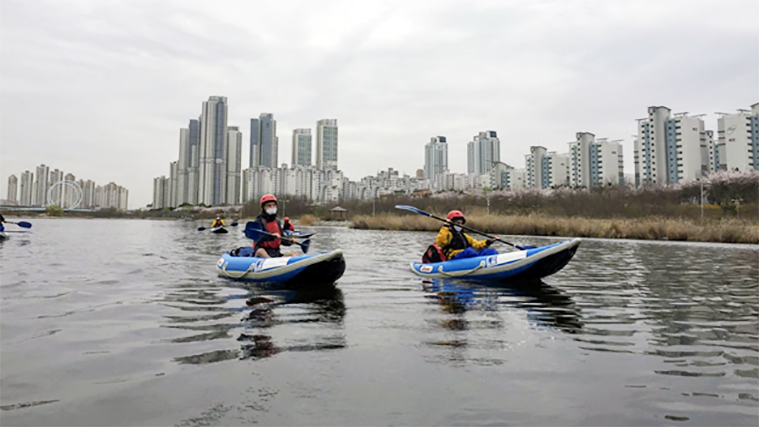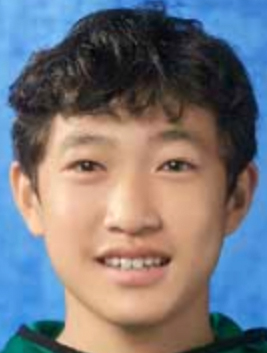
Every year, Chadwick International school students have to face a particular challenge; learning more about the world around us through experiencing them. Before the COVID-19 breakout, our school had sent students on bus rides that would sometimes even take a few hours. Considering that the Chadwick campus is located in Songdo, Incheon, it was a massive adventure for us, students, to travel to foreign places like Seosan, Hwacheon, and Tae-an for the past several years. This year, most students anticipated that the Outdoor education program would be not probable. However, the school decided to continue its Outdoor education program which to be located at our school.
In groups of around 10-15 people, students used to travel and explore all over a particular area we were located on, setting up our base camps on mountains, rivers, plains, or gravel areas. We cooked our own food, learned to take care of ourselves, and got to know more about every individual in our group as well as the environment around us. Previously, we had to hike kilometers every day with our tents and belongings. We also had other activities such as kayaking, solo time (being alone in nature,) and free time, where we usually spent time together as a group or in smaller groups, to do whatever we would like to do in the surrounding area of trees, rivers, grass, and many more natural features. But this year, it has changed a lot to fit the new standards that COVID-19 has set. OE (Outdoor Education) usually required a lot of physical activity and contact, including setting up tents with peers, sleeping together as a group, and cooking and cleaning together. The base camps were also in different locations every day. First of all, to avoid contact, every member of the group was provided with individual tents. The other items offered by the OE department, such as sleeping bags, rain jackets and duffel bags were not given out anymore. We also did not cook our food, and we did not move basecamps every day and set up tents every day.

But the most dominant change that has taken place was that the majority of the OE program was located on campus. The activities were done outside, but the tents were set up in designated areas in the school area. The time on OE varies depending on grade, and usually, 9th graders go on a trip of seven days and six nights. However, the distribution of time among different grade levels and minimizing possible corona spread caused it to shorten to two nights and three days. During those times, my group was located in the outdoor area near the garden, where individual tents were set up. Since we couldn't travel a long distance, the trip was organized so that we can understand and experience more of the local environment in our city and nearby cities of Songdo. Those included activities such as climbing the famous Mun-hak mountain located few kilometers away from the school campus, or kayaking in the Moonlight park river up and down the stream.

The thoughts of the students are also mostly positive. 83.3% of the students thought they actually did interact with the outdoor environment, even though it may have been in the city. On a scale of 1 to 10, 1 being that it has taught nothing about the environment and 10 being it was beneficial, there was an average of 7.83, which is a pretty high score. The surrounding mountains and rivers that we explored were somewhat challenging, as it was something that we would not do in our free time. However, it was something very new. All of the interviewed students said they got to know more about the city's surrounding environment, including Jinsung Park, a Grade 9 student in Chadwick International. He said: "I did not know that there are quite a few mountains in Incheon. There were also many undeveloped places nearby central park." William Kim, another student, said that "I did not know our city was beautiful and wonderful as it was when I experienced it through Outdoor Ed." Like this, Outdoor education has provided the students with the opportunity to learn more about the environment. Furthermore, the students enjoyed the new changes, including the availability of the school restroom, more solidarity among the group, the single tent, food, and more etc.
Most students said that they enjoyed the experience of getting to know the natural environment around our local city, by a rate of 100%. However, some students did not think it was as good as the previous years. Junhyeok Jang, a student, said that “One disappointing part of this year’s trip was that the intensity of the program plummeted by a huge decline.” There were also other students who felt like it really wasn’t interaction with the “outdoors” this year.

Based on our current situation, this way was probably the safest way to enjoy outdoor education without violating the COVID-19 protocols. Even though it might have been different and new, most students were able to adapt quickly to the new given circumstances, and make the most out of it. I have enjoyed this year’s experience on Outdoor Education, because it was something that I would not do in my individual time and thought that it was a good opportunity to learn more about our local environment. However, I prefer the previous experiences rather than this one, because I agree that this was neither intense nor isolated in the outdoors.

Jimin Park
Grade 9
Chadwick International School

